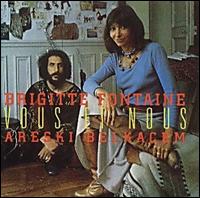
Brigitte Fontaine, is a singer of avant-garde music. She has employed numerous unusual musical styles, melding rock and roll, folk, jazz, electronica, spoken word poetry, and world. She has collaborated with Stereolab, Michel Colombier, Jean-Claude Vannier, Areski Belkacem, Gotan Project, Sonic Youth, Antoine Duhamel, Grace Jones, Noir Désir, Archie Shepp, Arno, and The Art Ensemble of Chicago. She is also a novelist, playwright, poet, and actress.
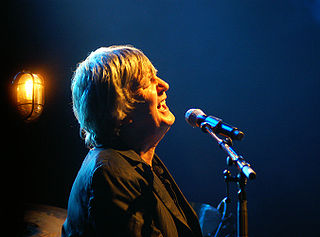
Jacques Joseph Victor Higelin was a French pop singer who rose to prominence in the early 1970s.

Matthieu Chedid is a French multi-instrumentalist and singer-songwriter.

Les Wampas are a French punk rock/psychobilly band, who refer more exactly to their music as "Yé-yé-punk". The band was formed in Paris in 1983.

Philippe Blanchard, known professionally as Philippe Katerine, is a French singer-songwriter, actor, director and writer who began his career in 1991. Some of his popular singles include "Mon cœur balance", "Je vous emmerde", and "Louxor j'adore".
Jean-Philippe Rykiel is a French composer, arranger, and musician, primarily a keyboard player. He has been blind since his birth, a result of negligence in the hospital incubator, and is the son of fashion designer Sonia Rykiel.

Daniel Lévi was a French singer-songwriter, composer, and pianist.

Pierre Barouh was a French writer-composer-singer best known for his work on Claude Lelouch's film A Man and a Woman as an actor and the lyricist/singer for Francis Lai's music score.

Champ is the second studio album by Tokyo Police Club that was released on June 8, 2010. Champ is the band's second studio album, after the release of Elephant Shell in 2008. Tokyo Police Club released the album's first single, "Breakneck Speed" for free download on their website on March 26, 2010. The next singles released off the album were "Wait Up " followed by "Gone".

Areski Belkacem, also known simply as Areski, is a French singer, multi-instrumentalist, comedian and composer.
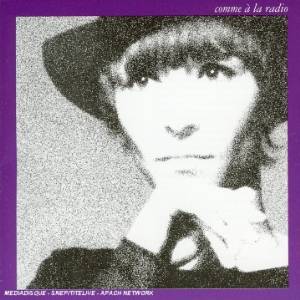
Comme à la radio is the fourth album by experimental French singer Brigitte Fontaine, recorded with Areski Belkacem and the Art Ensemble of Chicago. It was released in 1969 on the Saravah label after a series of concerts in 1969. It is Fontaine's most famous album, and is known outside of France on the 1990s alt-rock scene, thanks to laudatory comments from Beck Hansen, or Sonic Youth among others.
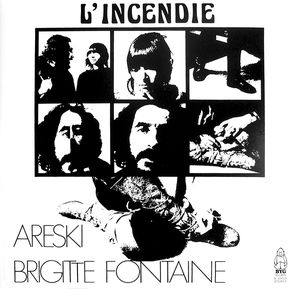
L'Incendie is the seventh album by experimental French singer Brigitte Fontaine and the fifth by Areski Belkacem, released in 1974 on the Byg Records label. It is their third collaborative album.

Le Bonheur is the eighth album by experimental French singer Brigitte Fontaine and the sixth by Areski Belkacem, released in 1975 on the Saravah label. It is their fourth collaborative album.

Libido is the sixteenth album by experimental French singer Brigitte Fontaine, released in 2006 on the Polydor label. It once again features a collaboration with -M- on the song Mister Mystère, which -M- also sang solo on his fourth album, to which it gave its title. Brigitte Fontaine, for the first time in more than thirty years, calls upon arranger Jean-Claude Vannier for some songs, Barbe à papa and Mendelssohn. The title of Château intérieur comes from a book by Teresa of Ávila, although Fontaine admitted she didn't read it.

Prohibition is the seventeenth album by experimental French singer Brigitte Fontaine, released in 2009 on the Polydor label. The album features political content, as it is described by Fontaine as "a rebellious album", and the song Partir ou rester was written as a reaction to the 2007 French presidential election.

J'ai l'honneur d'être is the nineteenth album by experimental French singer Brigitte Fontaine, released in 2013 on the Universal Music Group label. Areski Belkacem composed and arranged all songs except La Pythonisse and Les Crocs, which were composed and arranged by Jean-Claude Vannier.

Higelin et Areski is the second album by French rock singer Jacques Higelin and the first credited to Areski Belkacem. Higelin and Areski met at the army, and Higelin would later introduce Areski to Brigitte Fontaine, who would become his lover and creative partner. The songs on the album are mostly minimalistic and experimental.
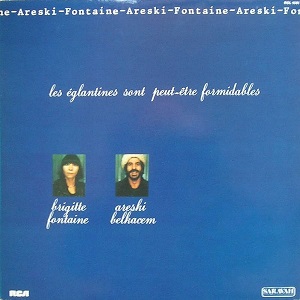
Les églantines sont peut-être formidables is the tenth album by French experimental pop musician Brigitte Fontaine and the eighth by Areski Belkacem, released in 1980 on the Saravah label. Because of its arrangements, described as almost "disco" by Fontaine herself, a sound that she can't stand, she has disowned the album and refused its re-release on CD, although it has been pressed in Japan in October 2008 by the Columbia Music Entertainment label.

Yasmine Dubois, known professionally as Lafawndah, is a singer, songwriter, producer and director.
